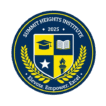
Program Overview
Program Duration: 2 Years (4 Semesters) Qualification Level: Diploma
The Diploma in Tourism and Hospitality Management at Summit Heights Institute is a dynamic and industry-aligned program designed to cultivate skilled professionals ready to excel in the global tourism and hospitality sectors. This curriculum is meticulously crafted to meet current market demands and global industry trends, emphasizing digital transformation, sustainable practices, personalized guest experiences, crisis management, and data-driven decision-making. Graduates will be equipped with a strong foundation in core operational and management principles, coupled with practical expertise in modern technologies and emerging industry challenges, preparing them for diverse roles in hotels, resorts, travel agencies, event management companies, airlines, and tourism boards.
Key Program Pillars
- Guest-Centric Excellence: Delivering exceptional service and memorable experiences.
- Digital & Tech Integration: Leveraging technology for operations, marketing, and guest engagement.
- Sustainable & Responsible Tourism: Promoting ethical and environmentally conscious practices.
- Global & Cultural Competence: Navigating diverse markets and international guest expectations.
- Operational Proficiency: Mastering core functions in accommodation, food & beverage, and travel.
- Crisis & Risk Resilience: Developing strategies for effective management during unforeseen events.
- Data-Driven Decision Making: Utilizing analytics for revenue optimization and strategic planning.
Learning Outcomes
Upon successful completion of this Diploma, graduates will be able to:
- Demonstrate a comprehensive understanding of the structure, operations, and interdependencies within the global tourism and hospitality industries.
- Apply principles of exceptional customer service and guest experience management across various hospitality settings.
- Manage front office, housekeeping, and food & beverage operations efficiently and effectively.
- Develop and implement strategic marketing plans utilizing digital platforms and e-tourism strategies.
- Analyze financial data relevant to tourism and hospitality businesses for informed decision-making and revenue optimization.
- Apply sustainable and responsible tourism practices to minimize environmental impact and enhance community benefits.
- Utilize hospitality technology, including Property Management Systems (PMS), Point-of-Sale (POS) systems, and online distribution channels.
- Understand and apply human resource management principles specific to the tourism and hospitality workforce.
- Plan, organize, and execute various types of events, from small gatherings to larger conferences.
- Identify, assess, and mitigate risks and manage crises effectively within tourism and hospitality operations.
- Communicate effectively with diverse stakeholders, demonstrating cross-cultural awareness and sensitivity.
- Develop entrepreneurial skills to identify opportunities and potentially launch new ventures in the sector.
Curriculum Structure
Year 1: Foundational Operations & Service Excellence
Semester 1
- THM101: Introduction to Tourism & Hospitality Industry
- Description: Provides a comprehensive overview of the global tourism and hospitality industry, its historical development, key sectors (accommodation, F&B, travel, events), economic impact, and current trends.
- Learning Outcomes: Define the scope of tourism and hospitality; identify key industry sectors; understand the economic and social impact of tourism; recognize current industry trends.
- THM102: Principles of Management for Hospitality
- Description: Covers fundamental management theories and practices, including planning, organizing, leading, and controlling, with a specific focus on their application within hospitality organizations.
- Learning Outcomes: Apply management principles to hospitality operations; understand organizational structures; develop leadership skills relevant to the industry.
- THM103: Service Excellence & Customer Experience Management
- Description: Emphasizes the critical role of service quality and guest satisfaction. Students will learn strategies for delivering exceptional customer experiences, managing guest expectations, and handling service recovery.
- Learning Outcomes: Define service quality; implement customer service best practices; manage guest feedback; resolve service issues effectively.
- THM104: Business Communication & Professional Etiquette
- Description: Develops essential communication skills for the workplace, including verbal, written, and digital communication, presentation skills, and professional etiquette crucial for interacting with guests and colleagues.
- Learning Outcomes: Communicate effectively in professional settings; write clear business documents; deliver engaging presentations; apply professional etiquette.
- THM105: Destination Management & Tourism Planning
- Description: Explores the concepts of destination management organizations (DMOs), tourism planning processes, product development, and the role of stakeholders in creating competitive destinations.
- Learning Outcomes: Understand destination management concepts; identify elements of tourism planning; analyze destination competitiveness.
Semester 2
- THM106: Hotel Operations: Front Office & Housekeeping
- Description: Provides an in-depth understanding of front office operations (reservations, check-in/out, guest services) and housekeeping management (cleaning procedures, inventory, quality control). Includes practical simulations.
- Learning Outcomes: Manage front office procedures; oversee housekeeping operations; utilize Property Management Systems (PMS) for front office tasks.
- THM107: Food & Beverage Operations Management
- Description: Covers the operational aspects of various food and beverage outlets (restaurants, bars, catering), including menu planning, service styles, inventory control, and basic kitchen management.
- Learning Outcomes: Manage F&B service operations; understand menu development; control F&B inventory; apply basic food safety standards.
- THM108: Tourism & Hospitality Marketing
- Description: Focuses on marketing principles applied to the tourism and hospitality sectors, including market segmentation, branding, promotional strategies, and distribution channels.
- Learning Outcomes: Develop marketing strategies for tourism products; identify target markets; create promotional campaigns.
- THM109: Financial Management for Hospitality
- Description: Introduces fundamental financial concepts, budgeting, cost control, revenue analysis, and financial statement interpretation specific to hospitality businesses.
- Learning Outcomes: Prepare basic hospitality budgets; analyze cost structures; interpret financial performance indicators.
- THM110: Human Resources in Tourism & Hospitality
- Description: Explores HR functions within the industry, including recruitment, training, performance management, employee relations, and legal compliance, with an emphasis on managing a diverse workforce.
- Learning Outcomes: Apply HR principles to hospitality staffing; develop training programs; understand employee relations issues; ensure HR compliance.
Year 2: Advanced Strategies, Digitalization & Global Trends
Semester 3
- THM201: Sustainable Tourism & Responsible Practices
- Description: Delves into the environmental, social, and economic dimensions of sustainable tourism. Topics include ecotourism, community-based tourism, carbon footprint reduction, and certifications for responsible tourism.
- Learning Outcomes: Implement sustainable tourism practices; assess environmental impacts; develop community engagement strategies; understand responsible tourism certifications.
- THM202: Digital Marketing & E-Tourism
- Description: Focuses on leveraging digital channels for tourism and hospitality marketing. Covers social media marketing, search engine optimization (SEO), online travel agencies (OTAs), content marketing, and online reputation management.
- Learning Outcomes: Develop digital marketing campaigns; manage social media presence; optimize online distribution; monitor online reputation.
- THM203: Revenue Management & Pricing Strategies
- Description: Teaches strategies for maximizing revenue through dynamic pricing, demand forecasting, inventory control, and segmentation. Includes practical application of revenue management software concepts.
- Learning Outcomes: Apply revenue management principles; forecast demand; implement dynamic pricing strategies; analyze revenue performance.
- THM204: Event Management & MICE Tourism
- Description: Covers the planning, organization, and execution of various events, including conferences, meetings, incentives, conventions, and exhibitions (MICE). Focuses on logistics, budgeting, marketing, and risk management for events.
- Learning Outcomes: Plan and execute events; manage event logistics and budgets; market events effectively; identify and mitigate event risks.
- THM205: Cross-Cultural Communication & Global Tourism
- Description: Explores the impact of culture on guest expectations and service delivery in a global context. Focuses on developing cross-cultural communication skills, understanding international travel trends, and managing diverse teams.
- Learning Outcomes: Adapt communication for diverse cultural contexts; understand global travel patterns; manage culturally diverse teams.
Semester 4
- THM206: Crisis & Risk Management in Tourism & Hospitality
- Description: Prepares students to identify, assess, and respond to various crises and risks (e.g., natural disasters, health pandemics, security threats, reputational crises) affecting the industry. Includes crisis communication and recovery strategies.
- Learning Outcomes: Develop crisis management plans; implement risk mitigation strategies; manage crisis communications; oversee recovery operations.
- THM207: Hospitality Technology & Innovation
- Description: Explores advanced hospitality technologies, including smart hotel solutions, guest relationship management (GRM) systems, AI and automation in service, data analytics for personalization, and cybersecurity in hospitality.
- Learning Outcomes: Evaluate emerging hospitality technologies; understand the role of AI in service; apply data for guest personalization; recognize cybersecurity threats.
- THM208: Niche Tourism & Specialized Markets
- Description: Examines the development and management of specialized tourism segments such as ecotourism, adventure tourism, medical tourism, culinary tourism, cultural heritage tourism, and accessible tourism.
- Learning Outcomes: Identify opportunities in niche tourism markets; develop specialized tourism products; understand the requirements of diverse traveler segments.
- THM209: Entrepreneurship & Innovation in Tourism & Hospitality
- Description: Fosters an entrepreneurial mindset, covering idea generation, business plan development, funding options, and the challenges and opportunities of starting and growing a business in the tourism and hospitality sector.
- Learning Outcomes: Develop a business concept; create a basic business plan; identify funding sources; understand the entrepreneurial ecosystem.
- THM210: Industry Project & Internship
- Description: A mandatory practical component where students gain real-world experience through an internship or a comprehensive industry project. This allows them to apply theoretical knowledge, develop professional networks, and build a portfolio.
- Learning Outcomes: Apply theoretical knowledge in a practical setting; develop professional skills; build industry networks; complete an industry-relevant project/internship report.
